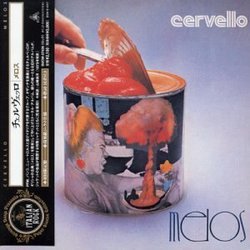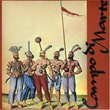| All Artists: Cervello Title: Melos (24bt) (Mlps) Members Wishing: 1 Total Copies: 0 Label: Bmg Japan Release Date: 2/28/2006 Album Type: Import, Limited Edition, Original recording remastered Genres: International Music, Pop, Rock Style: Number of Discs: 1 SwapaCD Credits: 1 |
Search - Cervello :: Melos (24bt) (Mlps)
 | Cervello Melos (24bt) (Mlps) Genres: International Music, Pop, Rock
Japanese reissue of 1973 album, packaged in a limited edition miniature LP sleeve. Ricordi/BMG. 2003. |
Larger Image |
CD DetailsSynopsis
Album Description Japanese reissue of 1973 album, packaged in a limited edition miniature LP sleeve. Ricordi/BMG. 2003. Similar CDs
|
CD ReviewsAnother incredible gem of Italian prog BENJAMIN MILER | Veneta, Oregon | 03/01/2003 (5 out of 5 stars) "Cervello was another one of those Italian prog bands that gave us one album then disappeared. Melos, was that one and only album from Cervello. Originally released in 1973 on the Ricordi label, same label that gave us Banco and Museo Rosenbach, the original LP comes with a gimmick cover, which was nicely replicated to CD size when Si-Wan Records in Korea reissued this on CD. Anyway, if you're a fan of Osanna, particularly Palepoli, you need Melos. As a matter of fact, guitarist Corrado Rustici was the younger brother of Osanna's Danilo Rustici, so of course the comparisons to Osanna can't be avoided. But I can also compare this with Semiramis (particulary because vocalist Gianluigi di Franco sounds just like Michele Zarrillo) and of Biglietto Per L'Inferno (because of that similar sinister atmosphere), so if you're a fan of those groups, you're sure to enjoy Melos as well. Like Osanna, Cervello featured sax and flute, as well as the usual guitars and vocals, but unlike Osanna, the flutes and sax are more tame, and there's no Mellotron like on Palepoli, but the music is still quite incredible. The opening "Canto del Capro", which starts off with some really sinister chanting, before the music kicks in. Others highlights include "Trittico", "Scinsione" and the title track. And while Cervello disappeared from sight after this album, Corrado Rustici did not, he was later with a band called Nova, before coming to the United States, and unfortunately, playing with the likes of George Michael and Whitney Houston, which really smells of sellout to me, which is too bad. On Melos, Rustici's guitar playing is very much like Mahavishnu Orchestra's John McLaughlin (no surprise as McLaughlin was one of Rustici's guitar heros). As a matter of fact, if McLaughlin was a member of Osanna, it would end up sounding like Cervello. Anyway, as far as Italian prog is concerned, Melos ranks up there with Banco's Darwin and Io Sono Nato Libero, Museo Rosenbach's Zarathustra, Osanna's Palepoli, and PFM's Per Un Amico. Essential stuff, as far as I'm concerned." How obscure can you get? relayer66 | FPO, AE United States | 08/14/2003 (5 out of 5 stars) "I am a huge fan of Italian prog, and I am familiar with much of the repertoire. Very rarely in music, you run into something which is so obscure, unknown and rare, and which completely blows you away. This disc is one of the best pieces of music I've ever found. It's consistently superb from start to finish. It's consistent harmonically, in complexity, and has real scope, at turns sinister and soothing. It has a unique sound to it, and isn't as derivative of English bands or American fusion groups as some other Italian prog...though if you like Genesis and Mahavishnu I don't see why you wouldn't like this one. It epitomizes dark heavy Italian prog such as Il Balletto di Bronzo, Osanna and Museo Rosenbach. I don't know why this is always mentioned (usually in a lesser light) in connection with Palepoli, besides the guitarists being brothers. This is the better album IMO." An obscure masterpiece Warren W. Nelson | Mooresville, NC USA | 08/27/2006 (5 out of 5 stars) "This release of a spectacular masterpiece of early seventies Italian progressive rock is yet another example of the wide gap between the producion of art and commercial success. This discrepency is demonstrated in the fact that this sole release by Cervello artistically rivals some of the very finest prog ever made: with soaring and complex melodies, compelling and angular instrumental passages culminating in some aggressive individual performances, all weaved together in a tapestry of beautiful and emotional musical syncopation. One of the few Italian prog releases without a prominent keyboard arsenal, the rich sound of this band is achieved with powerful drumming, multiple woodwinds, and intellegent scaler runs on guitar. But not least of all are the typically emotionally powerful vocals. Dynamic change-ups and exquisite group interaction complete another example of one of the finest Italian progressive albums you will ever hear. This is one of the more consistantly perfect albums in the progressive genre and comes with my highest reccomendation."
|

 Track Listings (7) - Disc #1
Track Listings (7) - Disc #1